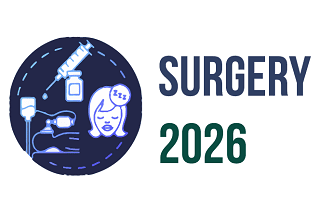4th International Conference on
Surgery and Anesthesia
November 26-27, 2026 | Dubai, UAE

Address: Al Barsha, Al Barsha 1, Dubai, United Arab Emirates
Surgery 2026

Howard University College of Medicine, USA
Abstract:
Background:
Cataract surgery is increasingly common among older adults, but the type of anesthesia used, general versus local, may influence long-term cognitive outcomes. While local anesthesia is preferred due to reduced preoperative risks, its association with postoperative dementia remains unclear.
Objective:
To examine the relationship between anesthesia type and the
risk of developing unspecified dementia in older adults undergoing cataract
surgery.
Methods:
This retrospective cohort study used data from the TriNetX
Global Collaborative Network, including 147 healthcare organizations. Patients
aged ≥60 years who underwent cataract surgery with either general or local
anesthesia were selected. After 1:1 propensity score matching, 18,845 patients
were included in each cohort. The primary outcome was new-onset unspecified
dementia (ICD-10: F03) diagnosed between 90 and 3,650 days post-surgery. Risk
analysis and Kaplan- Meier survival analysis were conducted.
Results:
The dementia incidence was significantly lower in the
general anesthesia group (0.4%) compared to the local anesthesia group (1.3%).
The risk difference was -0.9% (95% CI: -0.011 to -0.007, p
< 0.0001), with a risk ratio of 0.301 and an odds ratio
of 0.299. Kaplan-Meier analysis confirmed a lower risk of dementia in the
general anesthesia group across all time points.
Conclusion:
General anesthesia is associated with a significantly lower
risk of developing postoperative dementia compared to local anesthesia in older
adults undergoing cataract surgery. These findings warrant further
investigation into anesthesia's long-term cognitive effects
Biography:
Nicole Chapman has completed her M.S at the age of 24 years from Georgetown University. She is currently enrolled as a second year medical student at Howard University College of Medicine in Washington D.C. Nicole’s areas of interest include anesthesia, cardiology and geriatrics.
